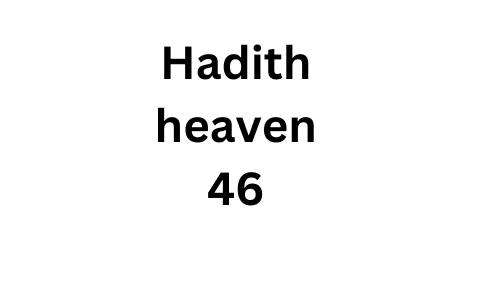In the world of Islam, the Qur’an is revered as the primary source of divine guidance, directly revealed to the Prophet Muhammad (peace be upon him) through the angel Jibreel (Gabriel). However, alongside the Qur’an, the Hadith, or the sayings and actions of the Prophet Muhammad (PBUH), hold an essential place in the daily lives of Muslims. While the Qur’an provides the foundational principles, the Hadith offers practical examples and explanations of how to live according to these divine commands.
What is a Hadith?
The word Hadith in Arabic means a “report” or “narrative.” In Islamic terminology, it refers to the sayings, actions, and approvals of the Prophet Muhammad (PBUH). The Hadith serves as a commentary on the Qur’an, guiding Muslims in areas of life that are not elaborated in the holy book, such as specific acts of worship, ethical behavior, and interpersonal relationships.
Each Hadith consists of two parts:
- Isnad (chain of transmission): This traces the sources of the Hadith back to the Prophet Muhammad (PBUH).
- Matn (text of the narration): This is the actual content of the Prophet’s saying or action.
Why Are Hadith Important?
- Clarifying the Qur’an: The Qur’an often provides broad guidelines. It is through the Hadith that Muslims learn the specifics of how to follow these guidelines. For instance, while the Qur’an commands believers to establish prayer (Salah), it does not describe in detail how to perform it. The Hadith fills this gap, offering instructions on how the Prophet prayed, and how Muslims should follow that practice.
- A Model for Living: The Prophet Muhammad (PBUH) is considered the ultimate role model for Muslims. His character, actions, and words provide a perfect example of how to live a life pleasing to Allah. The Hadith narrations offer insight into how the Prophet dealt with daily matters, interacted with others, and maintained a strong relationship with Allah. For example, Hadith guides Muslims on how to conduct business transactions with integrity, how to treat family members with kindness, and how to maintain honesty in all interactions.
- Establishing Islamic Law (Sharia): Along with the Qur’an, Hadith is a primary source of Sharia law. Islamic jurists use both sources to derive legal rulings and provide solutions to modern-day issues. Without the Hadith, it would be impossible to fully understand and implement many aspects of Islamic law.
- Strengthening Faith: The Hadith offers believers a way to deepen their connection with the Prophet Muhammad (PBUH). Knowing his personal struggles, wisdom, and acts of kindness provides an emotional and spiritual boost to Muslims who seek to emulate his noble characteristics.
Types of Hadith
There are different categories of Hadith based on their authenticity and content:
- Sahih (Authentic): These are the narrations that have a sound chain of transmission and are free from any defects. Examples include Sahih al-Bukhari and Sahih Muslim.
- Hasan (Good): These narrations are sound but may have some minor flaws in the chain of narrators. They are still considered reliable.
- Da’if (Weak): These narrations have defects in the chain of transmission and are generally not used for deriving religious rulings, although they may be cited for ethical teachings.
- Mawdu’ (Fabricated): These are false narrations that were wrongly attributed to the Prophet Muhammad (PBUH). Islamic scholars rigorously verify Hadith to ensure only authentic narrations are followed.
How Hadith Are Collected and Verified
The process of collecting Hadith was meticulous. Early Muslim scholars developed a science called Ilm al-Hadith (the Science of Hadith) to critically assess the authenticity of each narration. They would evaluate the chain of narrators to ensure that each person in the chain was trustworthy, known for their good character, and had a sound memory.
Among the most respected collections of Hadith are:
- Sahih al-Bukhari
- Sahih Muslim
- Sunan Abu Dawood
- Jami’ at-Tirmidhi
- Sunan an-Nasa’i
- Sunan Ibn Majah
These collections are widely accepted by Sunni Muslims and serve as authoritative references for religious matters.
Applying Hadith in Modern Life
In today’s fast-paced and ever-evolving world, many Muslims turn to Hadith to seek guidance on contemporary issues. Whether it’s navigating ethical dilemmas in business, balancing family responsibilities, or maintaining one’s spiritual obligations, the timeless wisdom found in the Hadith continues to provide relevant solutions.
For example:
- In matters of financial dealings, Hadith provide clarity on the importance of honesty and fairness.
- On family and community matters, Hadith encourage Muslims to be kind, just, and respectful to one another, fostering strong relationships built on trust and compassion.
Conclusion
The Hadith is a treasure trove of knowledge for Muslims, offering insights into the life of the Prophet Muhammad (PBUH) and guiding believers in all aspects of life. Whether it’s understanding the deeper meanings of Qur’anic verses, deriving laws for practical living, or simply seeking inspiration to be a better person, the Hadith serves as an indispensable source for any Muslim striving to follow the path of Islam.
At Hadith Heaven, we are dedicated to sharing authentic and inspiring Hadith to help Muslims around the world connect with the Prophet’s teachings and lead a life in accordance with Islamic principles. Let these narrations inspire you, motivate you, and bring you closer to your faith.
